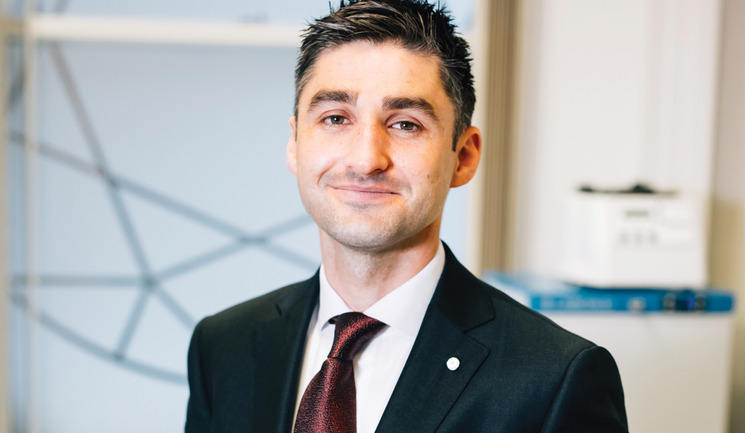Aesthetic trainer and Merz Innovation Partner Dr Chris Hutton discusses his career and the importance of education and training within aesthetics
Dr Chris Hutton has always had a keen interest in education. He was born in Derry city, Northern Ireland, but after completing his medical degree in 2009 at Queen’s University, Belfast, he decided to continue living in the city and has stayed for the past 17 years. He reflects, “Although I studied medicine at university, I have always had an interest in the arts, particularly visual art. Obviously, art is a big part of aesthetic practice, and I thought the mix of science and art was a marriage made in heaven for me!”
He began working within the aesthetics specialty in 2011. “I joined foundation courses initially and progressed from there. I started injecting on a small-scale, and my interest in the industry and passion grew,” he says. Dr Hutton then undertook postgraduate training in aesthetic medicine at Queen Mary University of London. “My education at Queen Mary allowed me to consolidate my knowledge and understanding, while furthering my technical skills within aesthetics and I believe that I got the most use out of my training from here. I personally think some university level education in aesthetic medicine would benefit all,” notes Dr Hutton.
In 2013, he opened his own clinic in Belfast, Array Aesthetics, which specialises in aesthetic treatments. Dr Hutton explains, “Leaving the NHS was a scary time! Medical training felt like a conveyor belt to me at times and I just didn’t want to do it anymore… I felt the time was right to take the leap into my aesthetics career. The first two years of starting Array Aesthetics were the most difficult – trying to balance learning and developing technical skills, along with the business elements was a challenge but I was enjoying it.” Dr Hutton now offers bespoke training courses for medical professionals through his training academy, Array Academy. “Recently, the academy has celebrated training 1,000 delegates within four years, which I am extremely proud of,” he says.
In July 2021, Dr Hutton became a Merz Innovation Partner, alongside aesthetic practitioner Dr Dev Patel and dermatologist and hair restoration surgeon Mr Max Malik, as part of the company’s new educational team. He comments, “I have been using the Merz portfolio of injectable products since I first began practising almost 10 years ago. I have a really good sense of how they work, and after doing around 10,000 treatments I really should do! Being invited to become an Innovation Partner with Merz is something I’m very proud of and is definitely up there as one of my proudest achievements within medical aesthetics so far.” His role as an Innovation Partner is to educate fellow medical professionals on the use of the Merz portfolio, specifically the BELOTERO dermal filler range and he will be doing training events online and face-to-face very soon. He adds, “I believe there are genuine, definitive advantages to using the Merz portfolio of products over other brands which I am really passionate about and want to convey to other aesthetic practitioners.”
Finding a work-life balance can be a challenge for Dr Hutton and being a father of four with triplets can have its challenges. He adds, “My triplets are two years old, and I have another daughter who is three so there is a lot of balancing between performing treatments, teaching at the training academy and having time for family life. My wife is a doctor and is heavily involved in the business, so this allows us to both be able to take control and have time for aesthetics and family.”
After working in aesthetics for more than 10 years, Dr Hutton continues to enhance his own knowledge as he notes that the industry is evolving rapidly every year. He says, “Within this industry you need to keep up to date. A treatment which was accepted practice one month ago might not be in the next. You only need to look at the increasing popularity in the use of ultrasound, for example, to see this. As such, I plan to further my own understanding of this topic to help maximise patient safety.” Similarly, Dr Hutton says arterial mapping of the face was not commonly used six months ago and is now becoming more popular in standard practice, which he thinks should increase as time goes on. He adds, “Arterial occlusion with dermal filler is every injector’s greatest fear. One thing I have learnt about the face is that you can never be certain where exactly the arteries lie. It’s not always like the textbooks! Having a means to map out where they are pre-treatment in each individual is only going to increase patient safety. This should be the top priority for anyone injecting filler. As technology inevitably improves and awareness grows amongst the injecting community, then so will the use of facial ultrasound. I am certain of this.”
My favourite treatment to perform…
I enjoy performing full facial rejuvenation treatments. I find it satisfying to see the results on patients who are noticing signs of ageing and want to improve their appearance. It can be a great confidence booster.
Best piece of career advice given to you…
Consultant plastic, reconstructive and aesthetic surgeon Mr Dalvi Humzah once told me to concentrate on being good at it while keeping my patients safe. Everything else will fall into place!
My industry pet hate…
Aesthetic training activities in locations such as hotels should not be happening. To be taken seriously by the medical community at large and to keep patients safe, we should only be performing treatments in clinical settings.


